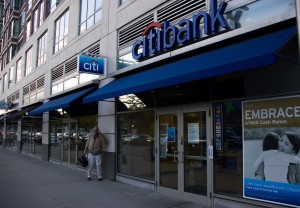
Students nationwide are banking with credit unions instead of national banks, according to WalletHub’s 2014 Banking Landscape Report.
The rise of credit unions as a form of consumer banking has become a crucially effective way for consumers, especially students, to build and accumulate their savings as credit unions are cheaper than other options and offer more features, stated the third quarter banking report, written by Alina Comoreanu.
“It’s no secret the nature of personal finance has shifted considerably in recent years. Technology has closed the door on the era of neighborhood banking, bringing consumers simultaneously closer to and farther away from their financial institutions of choice,” the report stated. “Widespread economic woes have unearthed a number of unsavory practices and institutional failures, while also saddling us with an uphill financial battle.”
The report claimed there is a significant difference in benefits for students using checking accounts, rather than savings accounts. Checking accounts are 68 percent cheaper and offer 28 percent more features with interest rates that are 86 percent lower, qualities unique to the Northeast.
“The Northeast offers the best balance of checking account features and fees, providing the highest average number of features and the second lowest average fee,” the report stated. “The Southwest offers the fewest features, and the Southeast charges the highest fees.”
Credit unions are 72 percent cheaper than national banks, offer 105 percent more features and provide 562 percent higher interest rates, according to the report. Raz Daraban, a spokesman for WalletHub, said anyone who can obtain credit union membership should consider utilizing this type of account.
“Student checking accounts are the cheapest. With this in mind, generally, CU [credit union] accounts are better for all types of consumers, not just students,” Daraban said. “CU accounts offer better deals [that are] cheaper with higher interest rates, [and] allow their members to maintain membership, even if they move away.”
Karla McCarron, spokeswoman for City of Boston Credit Union, agrees with the increase in student use of credit unions, and said she believes the nature of banking has changed.
“Students are using electronic communications with their financial institution of choice. [Students] do not need an ATM to access their cash, because they can use their debit card,” she said. “Between the ages of 18 and 24, student bankers begin to realize that they need to be more self-educated on how financial institutions work. It will help them in the long run if they know the differences between bigger banks and credit unions”
McCarron emphasized the economic impact in credit union use, which keeps business local.
“Statistically, 1 in 3 students remain in Boston after graduating, which creates a great impact on the city,” she said. “[This] can be seen in higher housing costs, building of more residential communities [such as the Seaport District], attractive job opportunities and easy access to entertainment/night life.”
When students begin banking on their own, McCarron said, they should always “read the fine print.”
Citibank has earned the “Best Student Checking Account” award from Money Magazine for the past two years, according to Andrew Brent, Citibank spokesperson.
“The Citibank Student Account offers students a simple banking product that comes with no minimum opening deposit, no monthly fees and no charges to use non-Citi ATMs, as well as access to online banking,” he said in an email statement.
Several students said they have considered using credit unions, but have decided against doing so for certain reasons.
Ammar Alameer, a sophomore in the College of Engineering, said she keeps her money in the Citibank student account because of its location.
“Although it is a national bank, it has no charges and lets them organize their money,” she said.
Leon Clark, a freshman in the College of General Studies, said he has considered using a credit union, such as the Metro Credit Union in Boston, but decided against it as the banks are “inconveniently located far from campus.”
“CU’s are great for high-scale amounts of savings, but not necessarily useful for quick access to cash,” he said. “[I am] not in the circumstances to be moving large amounts of money around, and credit unions require you to do so or else they charge you.”
Correction: In the previous version of this article, we said: “Citibank…offers students checking accounts that are 66 percent cheaper than the average personal account, but also providing 86 percent lower interest rates- these are some of the highest in the market, according to Andrew Brent, Citibank spokesperson.” This was something that was incorrectly stated, and has since been corrected.















I agree that CUs are getting much more traction now as a smart alternative to banks. However, I’d like to give an update to the above article in regards to Metro Credit Union.
In order to better serve the BU student and faculty, MetroCU has a very convenient location in Boston that is directly across from the BU Agganis Arena. It is at 922 Commonwealth Avenue.
MetroCU is here for the BU student population with checking, savings and loan products for while they are in college and when they graduate and move on. Come check us out – Go Terriers!